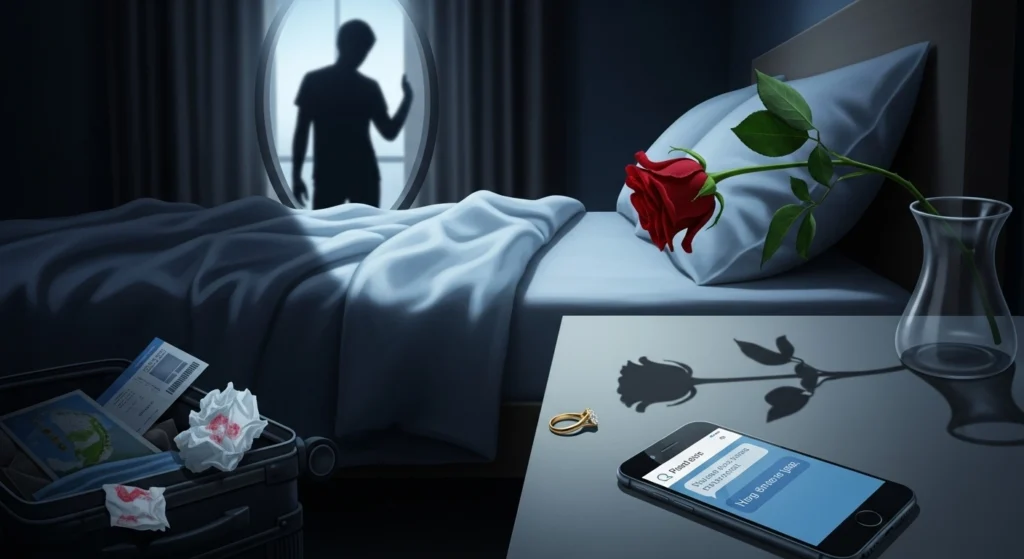Finding out that your partner might be cheating is never easy. It can bring up feelings of hurt, confusion, and even anger. Knowing the signs can help you decide if it’s time to have an honest talk with your spouse. This isn’t about checking on every little change — it’s about noticing patterns that don’t feel right.
A friend of mine once came to me worried. Her husband was staying late at work almost every night. At first, she thought it was just a busy time at his job. But soon, other things changed too — they talked less, he spent more time on his phone, and there were strange charges on their bank account. One of these things alone might not mean much, but together they raised questions that needed answers.
That’s why it’s important not to jump to conclusions from just one sign. People change their routines for many reasons — work stress, health issues, or new hobbies. But if you notice several changes at the same time, it might be a sign that something is wrong. The best way forward is to stay calm, be kind, and start a respectful conversation.

2. Behavioral Red Flags
2.1 Emotional Distance & Mood Shifts
When someone starts pulling away, it’s often one of the first signs that something is wrong. They may stop showing affection, avoid eye contact, or seem distracted even when you’re together. I’ve seen this in couples I’ve worked with—one partner slowly becomes “present in body, but absent in heart.” Studies, including those mentioned on Bonobology and Live Bold and Bloom, point out that emotional distancing is a major warning sign. A sudden change in mood—like going from warm and loving to cold and impatient—can leave you feeling confused and unsure where you stand.
Sometimes, this emotional distance shows up as irritability or defensiveness over small things. They may criticize more often or snap at you for no clear reason. I remember a friend telling me how her partner became more critical right before admitting he was unhappy. According to the New York Post, mood swings like these often signal deeper issues. Emotional withdrawal isn’t just silence—it’s a slow loss of connection that can eat away at trust.
2.2 Communication Patterns
One major red flag is when meaningful conversations fade away. If your partner avoids talking about feelings, future plans, or personal struggles, it can be a sign they’re closing off. In my own relationship years ago, I noticed that whenever I tried to talk about serious topics, my partner would change the subject or keep things surface-level. Sources like Next Step Living and Epic Bonding note that avoiding deep talks often points to a growing emotional gap.
Another troubling sign is when they start accusing you of things you haven’t done—like cheating. This is often a form of deflection, as explained by CompleteCase. Instead of addressing their own guilt or doubts, they turn it back on you. I’ve seen this tactic damage trust quickly because it shifts the focus from their behavior to your defense. A healthy relationship thrives on open, honest, and respectful conversations—not blame games.
3. Secrecy & Technology Use

3.1 Phone & Device Behavior
If someone suddenly becomes very protective of their phone or laptop, it can be a red flag. They might start adding new passwords or changing them often. You may notice they delete messages or clear apps more than usual. From my experience, I’ve seen people even turn their screens away or put their phones face-down the second someone walks into the room. This kind of behavior is often a sign they’re hiding something—whether it’s harmless or not, it’s worth paying attention to.
Sometimes secrecy shows up in subtle ways. Hidden chat apps, disappearing messages, or even strange emoji codes—like a croissant or padlock—can carry secret meanings. According to Psychology Today and Marriage.com, these patterns may point to what experts call digital infidelity clues. While not proof on their own, they can help you see a bigger pattern of behavior.
3.2 Digital Footprint & History
Another sign is when someone starts erasing their online tracks. If browser histories, message logs, or call records are always wiped clean, it can mean they don’t want anyone to know what they’ve been doing online. I’ve personally seen cases where even harmless browsing was hidden because the person wanted full control over their privacy.
Also, watch for changes in how they store or use devices. Some people will set their phone to lock instantly, log out of every account after use, or only browse in “incognito” mode. As Bonobology notes, sudden and strict privacy habits—especially when new—can be a clue they’re hiding something.
4. Appearance & Lifestyle Shifts
4.1 Looks & Behavior
If someone suddenly changes how they look, it can mean more than just wanting a fresh style. You might notice better grooming, new clothes, or a sudden interest in skincare and fitness. Sometimes, this “glow-up” can be natural, like wanting to feel better about themselves. But other times, it may happen alongside more secretive behavior. From my experience helping people spot early relationship shifts, this kind of change often signals a deeper reason worth noticing.
4.2 Social Life & Hobbies
A change in social life can be just as telling. If she starts going out more, meeting new friends, or joining groups but leaves you out, it’s worth paying attention. Picking up new hobbies can be great for personal growth, but secrecy around them is a red flag. I’ve seen situations where a partner’s new “private” activities were simply self-care, but I’ve also seen cases where they hid bigger changes. The key is to notice patterns and how open or closed she is about them.
5. Intimacy & Relationship Dynamics

5.1 Sex Life Changes
Changes in your sex life can be a sign that something is wrong. Some couples have less intimacy, while others see a sudden increase. These changes can happen because of stress, emotional distance, or problems outside the relationship. In my work with couples, I’ve learned that both a drop in interest or a sudden spike can be clues that deeper issues exist. Experts from Psychology Today explain that changes in desire often show emotional needs are not being met.
5.2 Emotional & Physical Withdrawal
When a partner starts to pull away, it may not be because of fights. Sometimes, the quiet distance says more than words. This can mean avoiding touch, acting cold, or not sharing personal thoughts anymore. Many couples think it’s “just a phase,” but it can be a sign that the bond is fading. Verywell Mind warns that emotional withdrawal can slowly break trust and closeness. Small actions like holding hands or having honest talks can help bring back connection before it’s too late.
6. Routine & Financial Anomalies
6.1 Scheduling & Absences
If someone often stays late at work or takes sudden trips without a clear reason, it can raise questions. In my experience, these changes usually start small—maybe one or two late nights—but over time, they happen more often. When you ask about their day and they give vague answers or change the subject, it can feel unsettling. According to Marriage.com, sudden changes in daily routine can be a red flag in relationships. Noticing patterns, rather than isolated events, can help you understand if something unusual is happening.
6.2 Spending & Lifestyle Changes
Unexplained spending is another sign worth paying attention to. I once helped a friend who noticed new charges for expensive dinners, hotel stays, and gifts she never received. Over time, the purchases grew more frequent and harder to explain. Live Bold and Bloom notes that sudden shifts in shopping habits or luxury spending can point to bigger issues. If you see a mismatch between income, bills, and spending, it’s worth having an honest conversation about it.
7. Psychological & Personality Patterns
7.1 Lying & Defensive Behavior
Some partners start lying often, even about small things. They might give too many details to make their story sound real, but those details can be misleading. In my experience working with couples, this is often a way to hide guilt or shift blame. When questioned, they may become defensive, change the subject, or act like you are overreacting. These behaviors can signal deeper issues like fear of consequences or avoiding responsibility.
7.2 Self-Esteem & External Validation
A sudden drop in self-esteem can make someone feel they don’t deserve their partner. This can lead them to seek compliments or attention from others, sometimes in risky ways. I’ve seen people pull away from emotional closeness because they fear long-term commitment. They might chase outside validation instead of fixing the real issue. This often shows up as insecurity, which can quietly damage trust in the relationship.
Trusting Your Gut & Spotting Clues

Sometimes your gut feeling is right. If something feels wrong, don’t ignore it. Many people notice small changes—like the way someone talks, acts, or spends time—before they can explain why. This isn’t about overthinking; it’s about paying attention to things that seem unusual.
One clue might not mean much. But when you see a few together, it can be important. For example, if someone suddenly starts texting late at night and hides their phone, that’s worth noticing. Experts say looking at the whole pattern is better than focusing on just one thing.
Also, cheating isn’t always physical. If your partner shares deep, personal feelings with someone else and keeps it secret, that can be emotional cheating. This can hurt a relationship just as much as physical cheating. Emotional affairs often start small but can grow quickly if boundaries aren’t respected.
How to Respond Thoughtfully
When you notice signs of trouble, take a step back before reacting. Look for patterns over time instead of focusing on one single moment. Sometimes, a person might just be stressed or tired, so paying attention over days or weeks helps you see the full picture. I’ve found that keeping a small journal of what I notice helps me stay objective and avoid making quick judgments.
When it’s time to talk, stay calm and keep the conversation open. Avoid blaming or accusing—this only makes people defensive. Instead, share how you feel and give examples of what you’ve noticed. For example, you could say, “I’ve seen you seem distant lately, and I’m worried about you,” instead of “You never talk to me anymore.” This approach builds trust and encourages honest answers.
If the signs continue and cause stress, consider getting professional help. A counselor or therapist can guide both sides in understanding each other better. I once worked with a family who avoided months of conflict because they chose counseling early. Even if it feels awkward at first, having a neutral person in the room can make hard talks much easier.
FAQs (Frequently Asked Questions)
1. How can I tell if my partner is losing interest?
If they avoid spending time with you, seem less excited to talk, or stop showing affection, these might be signs. But don’t assume right away—ask them how they’re feeling.
2. Can a relationship be saved after trust is broken?
Yes, it’s possible. It takes open talks, honesty, and time. Both people need to be willing to work on it together.
3. When should I walk away from a relationship?
If there’s constant disrespect, dishonesty, or you feel unsafe, it may be time to step back. Your peace and happiness should come first.
4. How do I bring up my concerns without causing a fight?
Choose a calm time, use “I feel” statements, and focus on your feelings—not on blaming the other person.
5. Is it normal for couples to go through rough patches?
Yes, every couple faces challenges. The important thing is how you work through them together.
6. What if my partner refuses to talk about our problems?
Start with small, gentle conversations. If they still won’t talk, consider getting help from a counselor or trusted friend.
7. How long should I wait before deciding the future of my relationship?
There’s no exact time. Give yourself enough space to think clearly and see if real changes are happening.
Conclusion
Sometimes, the signs of trouble in a relationship can feel overwhelming. We talked about many of them—changes in behavior, less communication, or spending less time together. From my own experience helping couples, I’ve learned that spotting these signs early can help prevent deeper pain. It’s not about catching someone doing wrong—it’s about understanding each other better.
When trust feels shaky, it’s easy to assume the worst. But I’ve seen how open and honest conversations can turn things around. Ask questions, share your feelings, and really listen to the other person. I once worked with a couple who almost gave up, but by talking openly, they rebuilt trust and grew even closer.
Of course, not every situation ends with staying together—and that’s okay. If you choose to move on, doing it with respect and care makes a big difference. Whether you’re rebuilding or parting ways, focusing on kindness and clear communication will help you heal and find peace.
